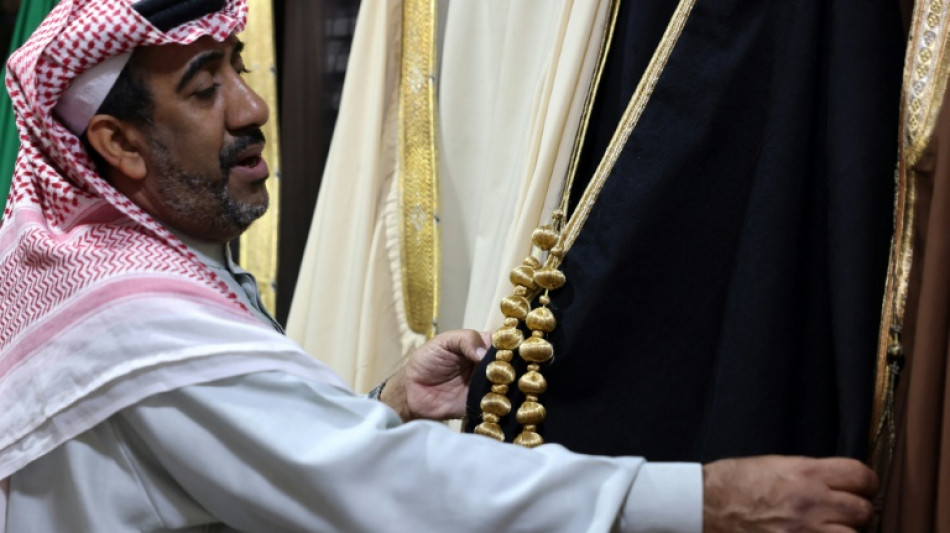
RBGPF
1.0200


Saudi tailor Habib Mohammed's shop once made ornate, hand-woven cloaks for royals, a time-honoured craft he is determined to preserve even as mass-produced garments flood the market, threatening his traditional business.
He makes "bisht", a long gown which for centuries has been a status symbol, worn by kings and princes -- and ordinary men -- and could take a week of meticulous work to create.
Now, with cheap Chinese-made robes taking a bite out of his business, the 60-year-old tailor is struggling to make a profit, and his only son wouldn't take over the beleaguered shop.
But Mohammed refuses to let the ancient craft die, searching for ways to hand down his knowledge.
"We've started training here at the shop and at home," he told AFP in his windowless atelier in the oasis city of Hofuf, with bishts hanging all around.
"I am teaching my grandchildren, be they girls or boys."
In Mohammed's native Al-Ahsa governorate, it was "considered shameful for a man to go to a funeral or a market, or make a visit to anyone anywhere without wearing the bisht", he said.
The bisht came to global attention in 2022 when Qatar's emir draped one over football star Lionel Messi after the World Cup final.
Although Arabs across the Gulf still sometimes wear traditional garb, especially in formal settings, factory-made clothing has replaced tailor services in the oil-rich countries of the region.
- Robe 'recession' -
At his workshop, Mohammed watched over his granddaughter Fajr, nine, and grandson Ghassan, 10, as they embroidered delicate gowns.
For the veteran craftsman, who learned to weave when he was only five, this is "my entire life".
"I came into this world... seeing only bishts around me," said Mohammed, wearing the Saudi national dress of white thobe robe and chequered red-and-white headdress.
"I was born in (my father's) tailor shop and grew up watching my mother sew. I saw my brothers and cousins work with my father in the tailor shop," he added with pride.
His wife was also a bisht seamstress, he said, skilled at collar embroidery.
But his modest shop in an artisans' market in Hofuf has fallen on hard times.
"A sort of recession has taken hold," he said.
A high-quality bisht could once have fetched up to 6,000 riyals ($1,600), but machine-made cloaks sell for just a fraction of that price, Mohammed said.
"Pieces I would make for 1,500 riyals now go for 150 riyals. It's not enough to make a living."
- 'Didn't give up' -
Mohammed refuses to let the tradition die out, and he is far from alone.
A bisht revival is taking shape in Saudi Arabia even as it opens up to the world, attracting tourists and foreign businesses.
Last year, the kingdom ordered ministers and other senior officials to wear a bisht when entering or leaving the workplace or attending formal events.
Saudi Arabia has named 2025 the Year of Handicrafts, when it will promote and support 10 crafts including bisht-weaving.
And Gulf countries are trying to include the bisht on the UNESCO list of intangible cultural heritage in a bid to preserve the craft.
Some of the bishts hanging on the walls of Mohammed's workshop are at least a century old, he said, proudly presenting a brown robe made from sheep's wool.
"Someone offered me 200,000 riyals for this, but I refused to sell it because it is as dear to me as my life. It represents my country's history," he said.
"I want to pass them down to my children and grandchildren, and I will instruct them never to sell them," he said, pointing to the pieces on the walls.
Mohammed also gives weekly bisht tailoring lessons at a nearby institute, mostly for young people.
"We didn't give up," he said, training the younger generation "to revive an old heritage that was disappearing".
"We will bring it to life once more," said Mohammed.
U.Feng--ThChM